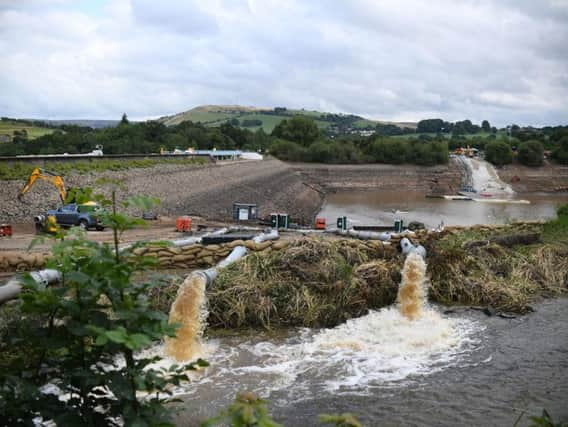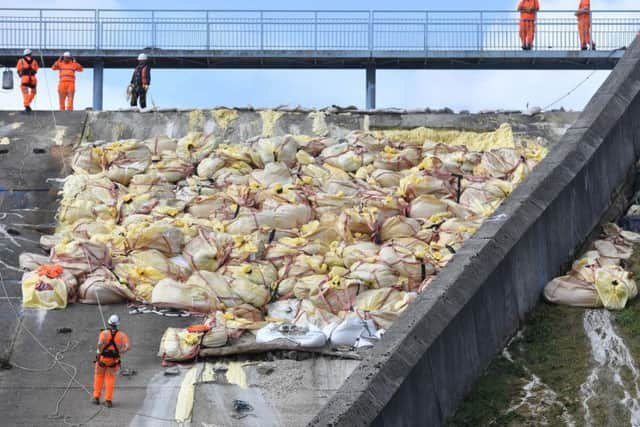Ministers must put flood risk at heart of reservoir policy before there is a dam disaster - Tom Richmond


Yet, as the inevitable inquiry begins to establish why parts of the dam wall started collapsing just months after passing a statutory safety inspection, there needs to be a wider review into the roles of the relevant agencies. I lost count of the number of organisations who appeared to be responsible for parts of a dam built in 1831 and the rescue operation – Defra, the Environment Agency, the United Utilities water company, the regulator Ofwat and the Canal and River Trust.
Yet the onus is on them, at present, to manage ‘drought risk’ rather than ‘flood risk’. This must change given there are more than 2,500 large reservoirs in Britain and that it is just over a decade since a disaster was narrowly averted at Ulley Reservoir near Rotherham. Decision-making – and accountability – needs to be much clearer, even more so given the age and potential vulnerability of the infrastructure in question.


Advertisement
Hide AdAdvertisement
Hide AdA starting point must be the legislation that Halifax MP Holly Lynch introduced to Parliament last month in response to the ever-present flooding risk in the Calder Valley as a result of the increased frequency of more extreme weather.
She explained how trials have been held, in the wake of the December 2015 floods, to lower levels in six reservoirs in the Upper Calder Valley so they have spare capacity, at times of heavy rainfall, to hold water before it cascades downstream into villages and towns.
Yet, while the initial results have been encouraging, it appears – from what Ms Lynch told MPs – that the law needs updating if the control of water is not to be left to nature (and chance).


Advertisement
Hide AdAdvertisement
Hide AdShe said: “Currently, the legislation that underpins water companies and the regulation of them has a focus on mitigating drought risk, rather than flood risk. We know that extreme weather will increase in frequency in the years to come, and reservoirs will be key in ensuring resilience within our water infrastructure if we are to manage both drought and flood risk. We need to give reservoir management of this kind a statutory thumbs-up, explicitly giving the Environment Agency the powers to instruct a water company to manage down the levels on pre-designated reservoirs, where the evidence suggests that doing so would reduce flood risk and protect communities.”
As well as reducing the threat to residents and business, Ms Lynch anticipates “the ability to transfer water between reservoirs and even across the country” to ensure not a single drop is wasted. “Yorkshire Water is currently exploring the possibility of directing the water released from its trial reservoirs into its nearby treatment works, which is exactly the approach we would like to see,” she added.
To me, this common sense measure needs to be explored at a time when funding for flood defences, even in vulnerable cities such as Leeds, is so limited. And just because the Reservoirs (Flood Risk Bill) has been proposed by a Labour MP should not deter the Government.
Quite the opposite. It would be a dereliction of duty on the part of Ministers if they waited for a Victorian dam or reservoir to burst before acting and plugging the policy gaps. By then, it will be too late – for the residents, businesses and politicians concerned.
Advertisement
Hide AdAdvertisement
Hide AdIT is not just reservoirs where responsibilities need clarifying – it is the same with the becks in North Yorkshire which burst their banks. In a letter to constituents, Richmond MP Rishi Sunak explained how they were full of debris which, in turn, was exacerbating the flooding risk.
“Legally, the obligation for doing this may rest with individual riparian owners, but I am pushing the local authorities to work with the parish councils and local residents to do this pro-actively and quickly. We are also involving the Environment Agency as they likely need to advise on doing this correctly.”
It is further reason why flood prevention laws, framed over a century ago, need to be updated as soon as possible. The longer becks are blocked, the greater the risk.
Advertisement
Hide AdAdvertisement
Hide AdTHE Government can’t have it both ways over bountiful Boris Johnson’s now daily spending commitments. If Jeremy Corbyn was making such pronouncements, the Tories would be accusing him of making uncosted promises.
As such, the new Prime Minister – and the aforementioned Rishi Sunak, now Treasury chief secretary – need to do so if they want a grown-up debate about the economy during the next election.
I SEE MPs on Parliament’s Culture Committee plan to question cricket chiefs about their plans to capitalise on England’s World Cup success - in October.
By then, the domestic season will be over, the nights drawing in and football will have reasserted its pre-eminence with wall-to-wall coverage on TV and the radio.Any new initiatives to broaden the great game’s appeal should be in place now while the Ashes series between England and Australia is generating so much intrigue.
Advertisement
Hide AdAdvertisement
Hide AdTALKING of cricket, Test Match Special – still the best place to listen to ball-by-ball cricket commentary and chit-chat about the oddities of life- has been offering plenty of culinary delights from Phil Tufnell’s endorsement of Bettys, that great Yorkshire institution, to Geoff Boycott’s ‘stick of rhubarb’ when discussing batsmanship.
Now ‘dumplings’ can be added to the TMS recipe – the word that Boycott used to describe the technique of England’s batsmen during the first Ashes Test. Whatever next? Rhubarb dumplings?